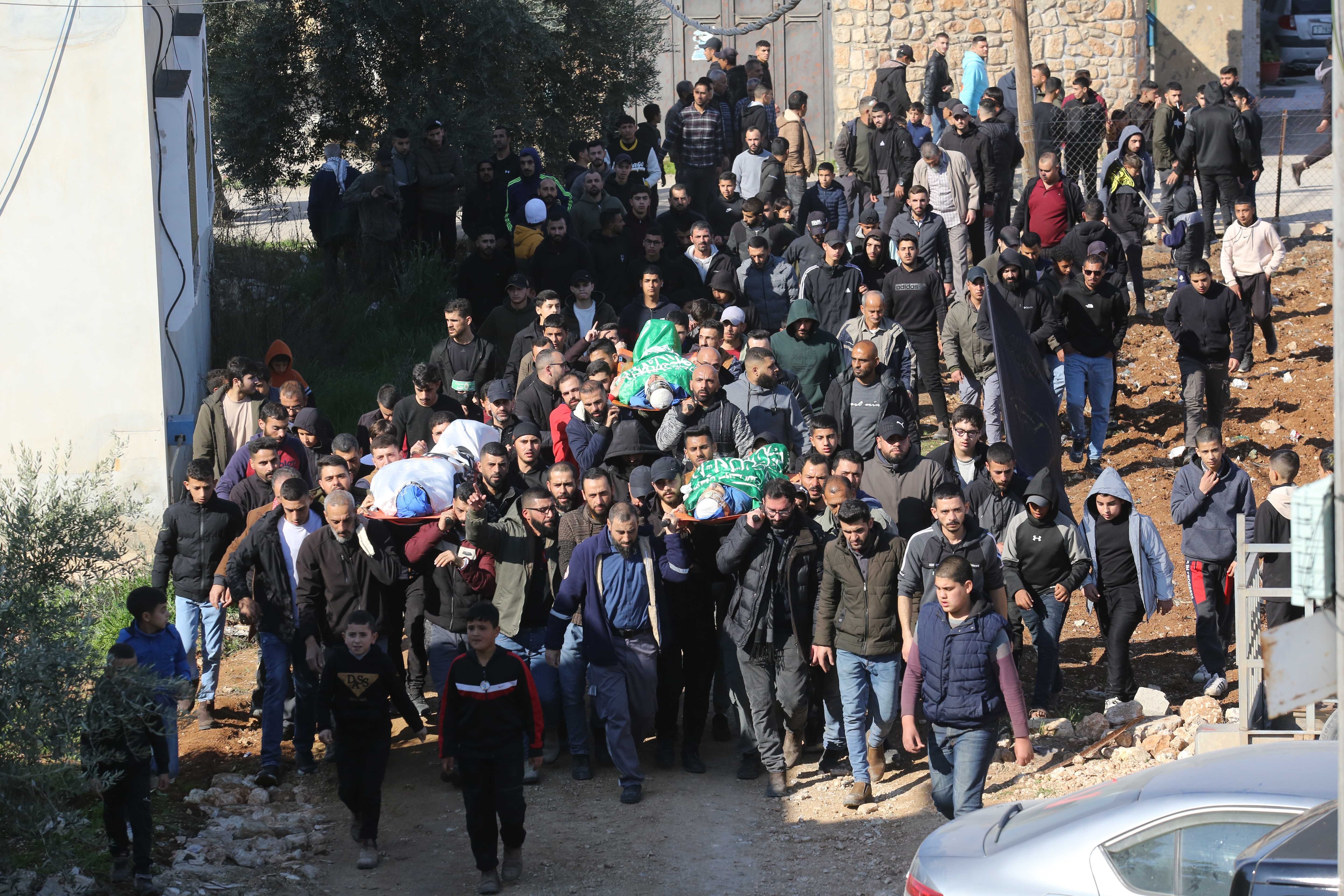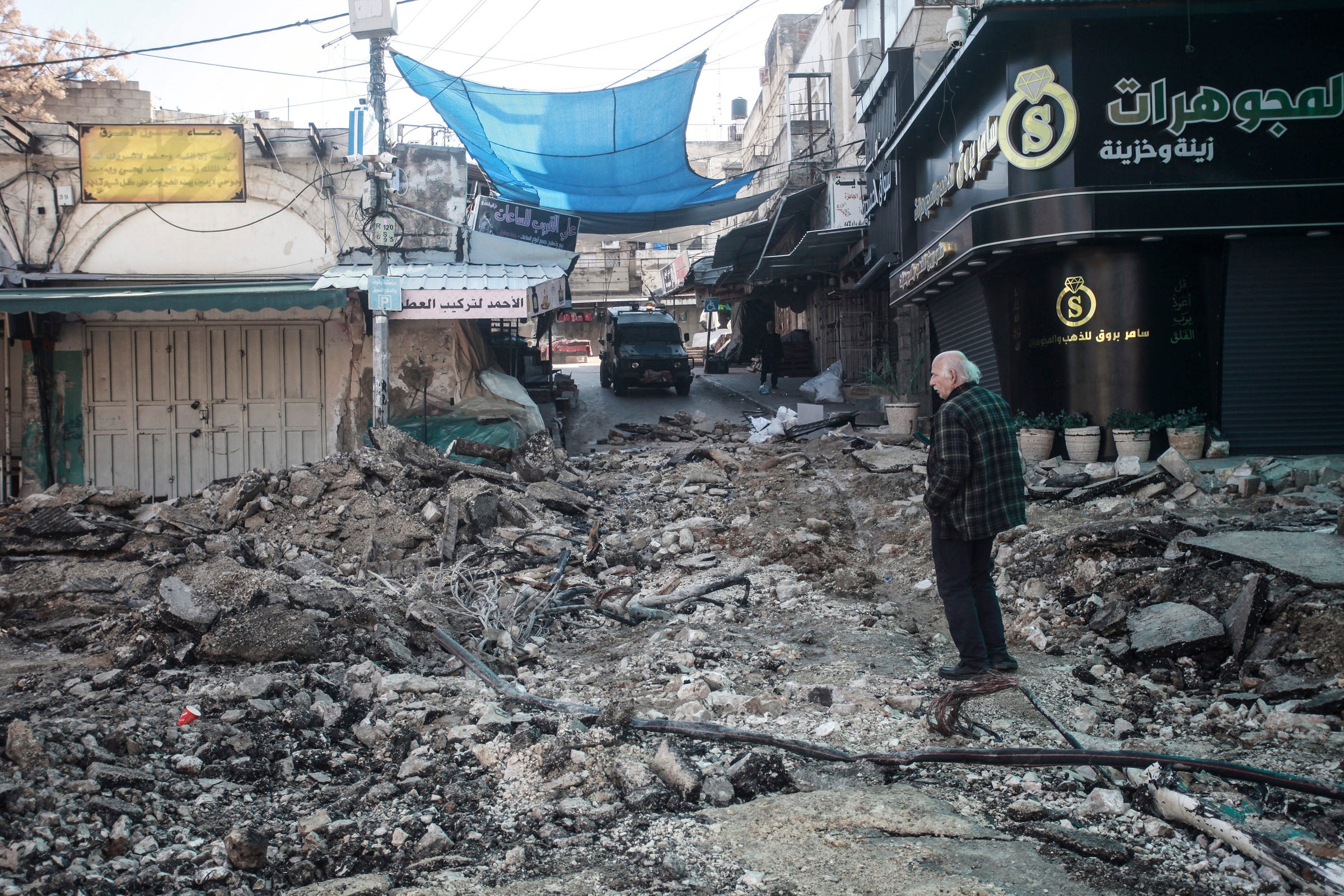Israel Escalates West Bank Military Assault, Invading Areas Across the North
Israel’s defense minister says troops will remain in Jenin refugee camp indefinitely

JENIN AND TULKAREM—An Israeli airstrike on a crowded neighborhood in the village of Tamoun in the northern West Bank on Wednesday killed at least 10 Palestinians, one of the single deadliest strikes in the West Bank in months. Minutes later, Israeli forces raided the city of Qalqilya and surrounding areas, escalating the military assault. Israeli troops backed by drones and fighter jets have now taken hold of all of the major districts in the north of the occupied territory.
Barely 48 hours after the “ceasefire” in Gaza came into effect on January 19, Israel announced “Operation Iron Wall,” a large-scale military operation to “defeat terrorism in Jenin.”
What began in the Jenin refugee camp has expanded to Tulkarem, Tubas, Qalqilya, Nablus, and Jericho. Dozens of homes have been destroyed and thousands of families have been forcibly displaced. In the span of 10 days, at least 37 Palestinians have been killed, including a two-year-old who was shot with a bullet to the head at home in Jenin.
A group of UN special rapporteurs released a statement this week saying the Israeli military operation in the West Bank “marks a dangerous escalation against Palestinians.”
“We are dismayed by the escalation of deadly violence sweeping through Jenin and the rest of the occupied West Bank,” the UN experts said. “Israel's repression seems to have no end in sight…The heightened assault on the occupied West Bank is part of an overall process of Palestinian forced displacement and replacement and the territorial expansion of Israel.”
In a publicized visit to the Jenin camp on Wednesday, Israeli defense minister Israel Katz, declared that troops would maintain a permanent presence there once the military operation was over. “We have declared war on Palestinian terror in the West Bank,” he said. “After the operation is completed, IDF forces will remain in the camp to ensure that terror does not return.”
Depopulating Jenin refugee camp
Within the first few hours of Operation Iron Wall, the Israeli army killed at least 11 Palestinians in the Jenin refugee camp, the vast majority of them civilians. Over the next three days, Israeli forces began systematically depopulating the camp—bombing neighborhoods, firing live ammunition, and bulldozing streets and homes.
“All we heard from the drones was ‘get out of your homes or we will kill you.’ We got afraid, and we left with only the clothes we had on,” said Haniyeh Dabayah, a 73-year-old resident who says she escaped the camp while being shot at by the Israeli army. Within days, the camp had been largely emptied, with thousands of families forced to take refuge in neighboring villages, staying either with relatives or friends, not knowing if or when they could return.
While Israeli military raids on the Jenin refugee camp have become common in the last three years, Operation Iron Wall set a new precedent by attacking the entire governorate of Jenin—which includes Jenin city and refugee camp and surrounding villages and towns—placing it on lockdown for days, with families unable to leave their homes as Israeli warplanes bombed sites across the area.
Dubbing it the “Wasps Nest,” Israeli military and intelligence have long targeted Jenin as a stronghold of armed resistance. Although relatively small and impoverished, Jenin refugee camp has been one of the few areas in the West Bank that has managed to organize armed groups across factional lines into the Jenin Brigade.
However, according to residents from the camp and other sources, most of the fighters in the Jenin Brigade left the camp early on in the Israeli operation. Only a handful opted to remain and confront the Israeli military.
A day before the latest Israeli invasion, Palestinian Authority security forces had concluded their own large-scale offensive on the camp dubbed Operation Home, one of the longest and most lethal assaults by Palestinian security forces in recent memory. At least 11 Palestinians were killed, mostly civilians, including one child. Security forces also arbitrarily detained dozens of residents and subjected them to torture and abuse.
The Israeli army invaded while Palestinian Authority armored vehicles and soldiers were still in the camp. “[The security forces] chose to withdraw from the camp in order to avoid direct confrontation with the Israeli army,” the Palestinian Authority security forces’ spokesperson, Gen. Brig. Anwar Rajab, said in a statement.
As the Israeli military conducted airstrikes on Jenin refugee camp, the Palestinian Authority detained several prominent Jenin Brigade fighters, including their spokesperson Abu Issam, as they were escaping.
With most of the fighters relocated outside the camp, the Israeli military began a campaign of “mowing the lawn,” in which residential buildings were bombed, bulldozed, and set ablaze. While journalists were again denied entry, the sounds of explosions and the sight of smoke from inside the camp were continuous.
By the seventh day, the majority of the camp had been destroyed. According to the Israeli military, more than 60 houses in Jenin were demolished and at least 3,000 families have been displaced, according to the UN. At the same time, Israel attacked neighboring towns and villages with drone strikes and ground troops.
“The sound of drones was so loud and close I thought they were in the house,” said Sameeh Hazza, a resident of Muthalath Shuhada, a small town southwest of Jenin. His two-year-old niece Laila Khateeb was shot in the head and killed on Saturday while in her home. “What did she do wrong?” Hazza says standing by her grave moments after the burial. “We were preparing to eat dinner and all we saw were red and green lasers in the house, then the bullets poured in.”

Assault on Tulkarem
By the second week, the operation had expanded to the governorate of Tulkarem, southwest of Jenin. On the morning of January 27, an airstrike on a car outside the Nour Shams refugee camp, located just outside the city of Tulkarem, killed two Palestinian fighters. Moments later, another airstrike hit Tulkarem refugee camp.
Within hours, Israeli bulldozers and soldiers were deployed deep into the city of Tulkarem. The main market was quickly emptied while the public hospital was encircled and put under siege. Similar to the operation in Jenin, the Israeli army began by targeting critical infrastructure in the city—destroying telecommunication networks and water mains.
“We were forced out of our home at gunpoint while explosions continued in the camp,” said Azza Kahle, 35. A mother of five, Kahle told Drop Site that she had never before witnessed this level of violence. “We weren’t allowed to take anything except our phones and the clothes we were wearing,” she said. “Now we’re displaced, with nowhere to go and my children are cold.”
Some families managed to reach the homes of relatives on the outskirts of Tulkarem, but dozens had nowhere to go and were forced to take shelter in the local mosque.
The Israeli military continued to escalate its attack, bulldozing streets and displacing dozens of families in the city itself. Many families were forced out of their homes at gunpoint as soldiers stationed snipers inside them and turned residential buildings into makeshift military posts.
“The Israeli army is besieging the entire city with an unprecedented number of soldiers sprawled across the area,” said Tariq Hishme, a journalism student from Tulkarem. “This did not even happen in this way during the Second Intifada, and the targeting of the city itself marks a terrifying and new escalation,” he said.
The Israeli military also obstructed medical personnel and journalists from accessing certain areas. As the army besieged the hospital, patients were unable to receive proper medical care. “I need to give birth,” said a pregnant woman as she stood several meters away from the hospital in the cold. It took medics hours to be able to coordinate her entry into the hospital.
“The goal of the Israeli forces besieging hospitals is to obstruct medics from reaching the wounded,” Ahmad Zahran, the deputy chief of emergency care in Thabit public hospital, told Drop Site. “They take hours in their security check,” he said. “The time they take in checking medics and verifying patients takes away from the patient's time."
According to Zahran, the level of violence in Tulkarem is like no other he has witnessed before. “I’ve been obstructed before, and they’ve invaded Tulkarem before, but this time it’s a different type of aggression.”
As medics were detained while on duty, journalists were targeted with stun grenades, teargas, and live ammunition. At least one journalist, Nagham Al-Zayet was injured with shrapnel in Tulkarem.
From Gaza to the West Bank
In the first three weeks of the new year, Israeli forces killed 26 Palestinians, including four children. In the last ten days—since the Gaza ceasefire and the launch of Operation Iron Wall—the Israeli military has killed 37 Palestinians in the West Bank, including four children.
“This is not random,” Roshdi Al-Norsi, a 43-year-old resident of Jenin refugee camp, told Drop Site. “This assault comes amid the release of Palestinian detainees and the suspension of bombs on Gaza. What Israel is telling us, is that we are not allowed to celebrate anything, not the release of the detainees, not the resistance, nothing.”
Israeli battalions that served in Gaza—including members of the Kfir brigades and the Skylark unit—have been deployed in Jenin as part of Operation Iron Wall.
“Look, over there in the distance. That smoke you see, that’s my home,” Abu Nizar, 63, told Drop Site. Standing on a hill overlooking Jenin refugee camp, he struggled to contain his grief. “Israel is vengeful, they see Jenin as Gaza, so as they leave Gaza with the ceasefire they’re coming here. After here, it’s the rest of the West Bank.”




Total barbarism while the so-called civilized world stands back, watches, and does absolutely nothing!
I pushed the like button but there's nothing to like about what's happening in occupied West Bank